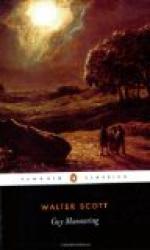’Before quitting the Border gipsies, I may mention that my grandfather, while riding over Charterhouse Moor, then a very extensive common, fell suddenly among a large band of them, who were carousing in a hollow of the moor, surrounded by bushes. They instantly seized on his horse’s bridle with many shouts of welcome, exclaiming (for he was well known to most of them) that they had often dined at his expense, and he must now stay and share their good cheer. My ancestor was, a little alarmed, for, like the goodman of Lochside, he had more money about his person than he cared to risk in such society. However, being naturally a bold, lively-spirited man, he entered into the humour of the thing and sate down to the feast, which consisted of all the varieties of game, poultry, pigs, and so forth that could be collected by a wide and indiscriminate system of plunder. The dinner was a very merry one; but my relative got a hint from some of the older gipsies to retire just when—
The mirth and fun grew fast and furious,
and, mounting his horse accordingly, he took a French leave of his entertainers, but without experiencing the least breach of hospitality. I believe Jean Gordon was at this festival.’[Footnote: Blackwood’s Magazine, vol. I, p. 54]
Notwithstanding the failure of Jean’s issue, for which
Weary fa’ the waefu’ wuddie,
a granddaughter survived her, whom I remember to have seen. That is, as Dr. Johnson had a shadowy recollection of Queen Anne as a stately lady in black, adorned with diamonds, so my memory is haunted by a solemn remembrance of a woman of more than female height, dressed in a long red cloak, who commenced acquaintance by giving me an apple, but whom, nevertheless, I looked on with as much awe as the future Doctor, High Church and Tory as he was doomed to be, could look upon the Queen. I conceive this woman to have been Madge Gordon, of whom an impressive account is given in the same article in which her mother Jean is mentioned, but not by the present writer:—




